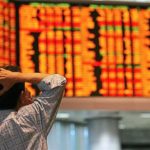 The rapid spread of the coronavirus since the turn of the year has caused tremendous uncertainty across the global stock markets, with recent falls representing the worst single day’s performance since 1987. A recent paper from the University of Warwick highlights how the spread of the virus has coincided with a significant increase in Google searches associated with economic anxiety.
The rapid spread of the coronavirus since the turn of the year has caused tremendous uncertainty across the global stock markets, with recent falls representing the worst single day’s performance since 1987. A recent paper from the University of Warwick highlights how the spread of the virus has coincided with a significant increase in Google searches associated with economic anxiety.
“Our findings suggest that the arrival of the new coronavirus leads to a flurry of search activity that, at least historically, can be linked with subsequent sizable contractions in consumer demand and real growth. This demand side contraction could add to the already expected disruptions of global supply chains and make an economic slowdown even more likely.” the researchers say.
The researchers analyzed Google activity from 190 countries, and observed a sharp increase in search activity in terms such as recession, survivalism and conspiracy theories. The paper notes that activity in these terms grew by up to 50% compared to the period prior to the virus emerging.
“We are naturally concerned that the gradual erosion of trust in institutions and particularly the media in the West in recent years may exacerbate the panic reactions that are becoming visible,” the researchers explain.
Misinformation
In addition to monitoring search trends, the researchers also conducted a survey of the US population, which revealed that there were largely skewed beliefs about both the contagiousness of the virus and its mortality rate.
“From what the medical literature has documented so far, a mortality rate markedly above 5% has little empirical support. Yet, more than 50% of respondents thought the mortality rate is higher than that. Similarly, more than 50% of the respondents thought that the contagiousness of the new coronavirus is higher compared to the current estimates available. This could well be beneficial in some sense as over-estimation may induce people to adopt behaviors that reduce the further spread of the disease. On the other hand, it could also fuel more panic,” the researchers explain.
As well as the obvious attempts to mitigate harm to health, governments are also striving to limit the economic fallout from the virus. The authors believe that the media has played a key role in shaping how people are perceiving the risks of the disease, and their subsequent levels of economic anxiety.
They believe that information from trusted sources, alongside transparent communication about government actions are key. Unfortunately, they accept that the erosion of trust in both the media and government may limit the effectiveness even when best practice is followed.
Nonetheless, they believe that bold and coordinated fiscal measures, not just nationally but internationally, can help help to tackle the growing economic anxiety that’s all too evident around the world.